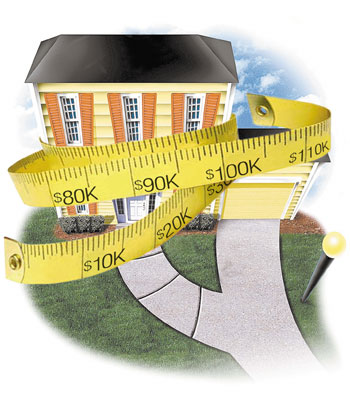 My last two listings sold quickly and sold over asking. My clients were ecstatic with the result, but there was still some obstacles left before the sale closed, namely the buyer’s property inspection and the lender’s appraisal. During the buyer’s property inspection there is always a possibility that the buyer’s inspector may find something that the seller’s inspector overlooked but as a seller, you can mitigate the likelihood of this by doing your inspections before listing the property.
My last two listings sold quickly and sold over asking. My clients were ecstatic with the result, but there was still some obstacles left before the sale closed, namely the buyer’s property inspection and the lender’s appraisal. During the buyer’s property inspection there is always a possibility that the buyer’s inspector may find something that the seller’s inspector overlooked but as a seller, you can mitigate the likelihood of this by doing your inspections before listing the property.
I always encourage the sellers to secure their own inspections before listing the property. These are crucial to ensuring a smooth transaction and avoiding any renegotiating during the escrow. Also, the inspections may uncover some physical aspects of the property that could easily be repaired and that will improve the marketability of the home.
Appraisals are different. There is little agents can do to ensure that the home appraises at the sale price. What makes matters worse is that we are experiencing the fallout from the mortgage crisis where there existed rampant appraisal fraud and extremely lax appraisers and appraising practices. As a result, the appraisal industry has been shaken up and tight appraisals and unwavering appraisers have become our reality.
The most frustrating aspect of appraisals is that they are extremely subjective. On one of my past listings, I had a particular property appraised three times with three different appraisers and all three values were considerably different. One appraisal came in at the contract price, one 10% under contract price and another 5% under contract price.
How can appraisals have so many discrepancies and be so subjective you wonder? Well, appraisals come up short for many reasons. A lack of comparables, an updated or an expanded home in an area where a majority of the homes are not similar, many dissimilar tracts within a small area, characteristics of an area which may not be consistent among all the homes in the area such as schools, unique locations, flood zones, and the use of appraisers from outside the area who are unfamiliar with the local market. To make matters worse improved homes are seldom reflected accurately on an appraisal report and the appraiser generally does not give adequate credit for the improvements or any superior characteristics.
A good example of these is swimming pools. Appraisers generally follow generic guidelines that may not reflect what buyers may value in a particular area. For instance, swimming pools in our area are generally seen to be a negative to buyers and affect the value of a property negatively. Nonetheless, appraisers will generally give a $10K premium to a property with a swimming pool. When you are comparing a home in the same neighborhood which sold with a swimming pool and your home sold $10K more, and the appraiser thinks it should be $10k less, in the end you have a $20K discrepancy.
The biggest issue is that buyers and seller’s see appraisals in different ways. In reality, an appraisal is a third-party assessment of value requested and used by the buyer’s lender to determine what the loan to value on the subject property should be. From the standpoint of a seller, a low appraisal rarely affects reflect the subject property’s true value and can be highly scrutinized especially since the buyer chooses the lender. To a buyer, the appraisal is what the lender is willing to loan on the property and therefore can affect the buyer’s ability to purchase. The problem arises for both buyer and seller when the appraisal discrepancy is large and making up the difference is too much for the buyer. This is when the seller faces a difficult decision; delay the contract to get a second appraisal from another bank, cancel the contract and sell to a different buyer, or renegotiate the price to a level that is acceptable to all parties and the buyer can secure the loan. The second option may not be favorable to the buyer and therefore the result may just be to cancel the contract.
So, as a seller, you must be thinking what’s the point then of going through fixing up your home to sell or staging it if the appraiser is just going to treat the home like every other generic home in the neighborhood and not give me credit for the improvements. My response is, you never can be too sure what will happen when you sell. You might be fortunate and get an appraiser who is more open and reasonable to your home’s value. Also depending on the seller and the circumstances surrounding the sale of your home, your agent may be able to convince the buyer to remove their appraisal contingency.
This is not recommended to all buyers and sellers, but if the buyer is confident in the home’s value and the price he or she offered and can make up the difference then this provides some assurance to the seller. It is not a 100% guarantee, but I won’t go into the complexities that may arise for fear of confusing or boring you to death.
The other factor, and the most powerful and effective, is choosing a real estate agent who knows the area, the values and recent sales, and making sure the agent is present at the appraisal. I, for instance, make it a point to meet the appraiser at all my listings and sales so that I can go over comps with him that I feel reflect the true value of the property. It’s never a sure thing, but as long as the appraiser is open minded and your comparables are within appraisal guidelines then it should be no problem. The main goal is to prevent a lazy or overextended appraiser from using just any comps which may negatively reflect the property’s value.





